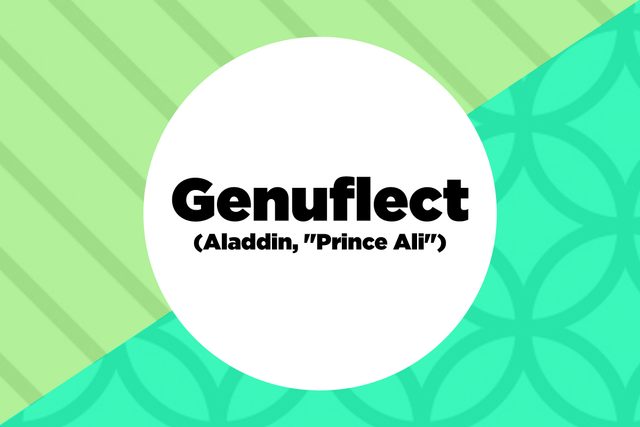
Genuflect (Aladdin, “Prince Ali”)
To genuflect is to show respect or worship by bending down on one knee. Robin Williams’ Genie pretty much nails it in “Prince Ali” when he commands the crowd: “Prince Ali! Fabulous he! Ali Ababwa/ Genuflect, show some respect/ Down on one knee!” Test your knowledge of Disney trivia with this quiz.
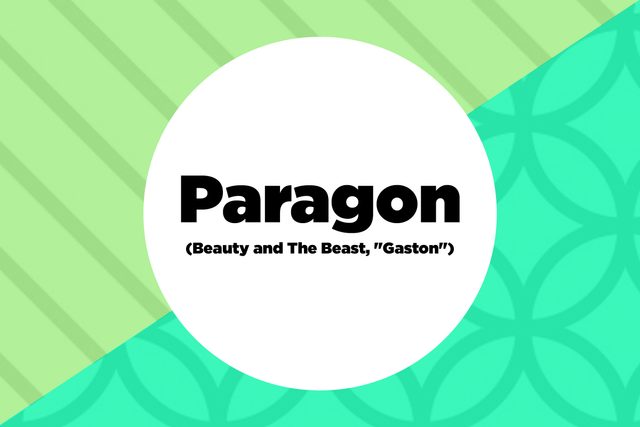
Paragon (Beauty and The Beast, “Gaston”)
A paragon is a person or thing regarded as the perfect example of something, or a general model of excellence. Oafish minion LeFou defines this word when he says of Gaston: “There’s no man in town half as manly/ Perfect, a pure paragon.” Bonus: Proving his manly excellence, Gaston goes on to provide us with another ten-dollar word: “I’m especially good at expectorating“—that is, hawking a loogie.
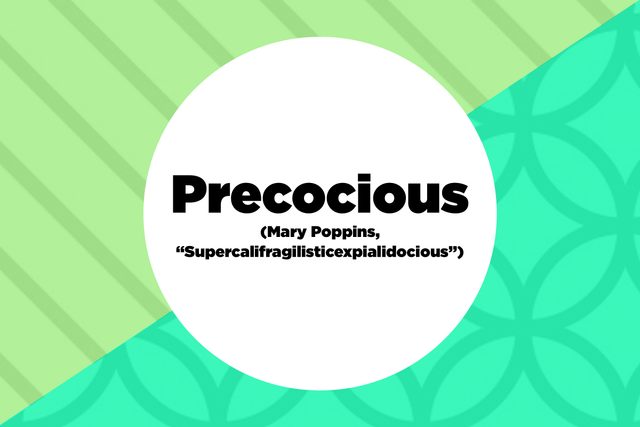
Precocious (Mary Poppins, “Supercalifragilisticexpialidocious”)
If a child is precocious, they have developed some set of skills or abilities earlier than is usual for their age. One mark of an early-blooming child might be the use of big, fancy words; as Mary Poppins reminds us, “If you say it loud enough/ You’ll always sound precocious/ Supercalifragilisticexpialidocious!” These three things are never allowed in Disney movies.
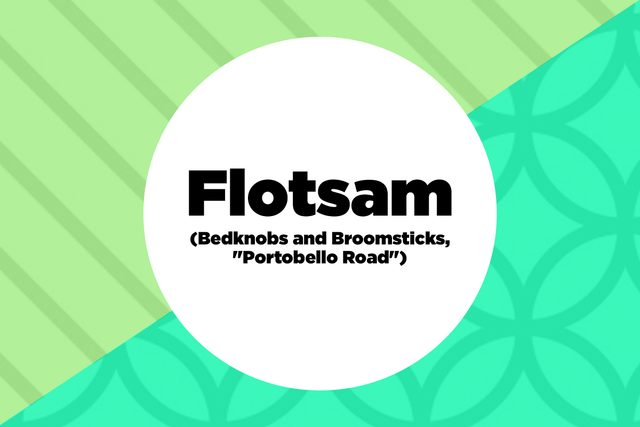
Flotsam (Bedknobs and Broomsticks, “Portobello Road”)
In nautical lingo, flotsam is the wreckage of a ship you might find floating on or washed up by the sea. More poetically, flotsam means a person or thing regarded as worthless—much like the secondhand rubbish and rubbish-merchants you might find inhabiting a flea market like London’s Portobello Road. As a chorus of shoppers sings in Bedknobs and Broomsticks: “Artifacts to glorify our regal abode/ Are hidden in the flotsam in Portobello Road.” Bonus: jetsam, often used in tandem with flotsam, is the stuff intentionally jettisoned overboard to make a ship lighter. Flotsam and Jetsam, fittingly, are the names of Ursula’s eel flunkies in The Little Mermaid.
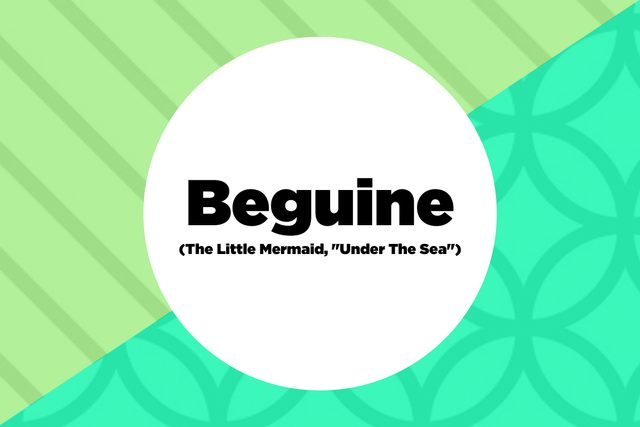
Beguine (The Little Mermaid, “Under The Sea”)
The beguine is a foxtrot-like dance to a bolero rhythm, which originated in the French West Indies. Despite what you’ve thought for years, Sebastian the crab is not just repeating “begin” with a funny accent when he sings, “When the sardine/ Begin the beguine/ It’s music to me.”
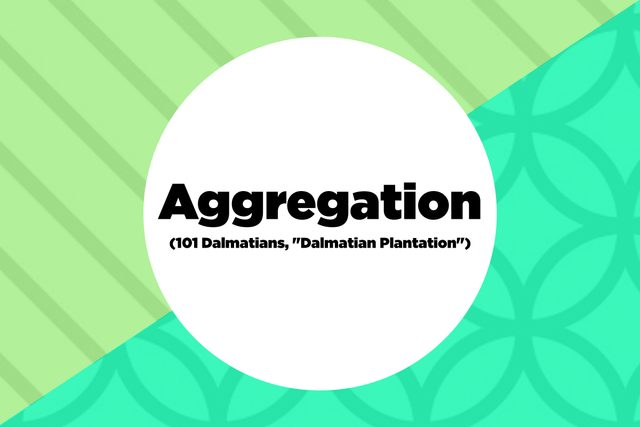
Aggregation (101 Dalmatians, “Dalmatian Plantation”)
An aggregation is a group or collection composed of many distinct parts—like, say, a couple of humans and 101 dalmatians. When composer Roger Radcliffe dreams of a place to house his new profusion of puppies, he sings, “We’ll have a Dalmatian plantation/ Where our population can roam/ In this new location/ Our whole aggregation/ Will love our plantation home.” You probably never knew these 15 surprising facts about Disney characters.
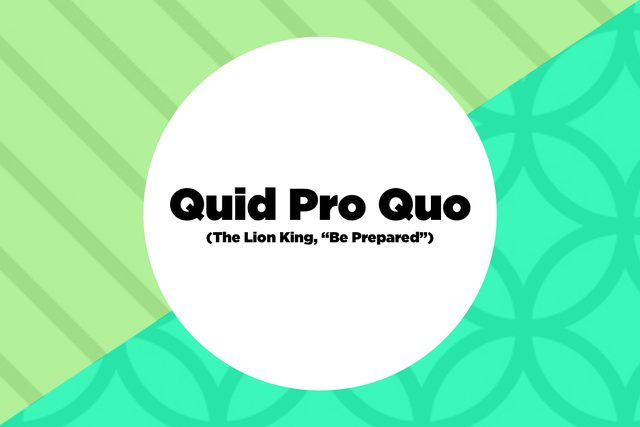
Quid Pro Quo (The Lion King, “Be Prepared”)
Quid pro quo is a Latin phrase meaning “something for something”—in other words, I’ll scratch your back if you’ll scratch mine. In The Lion King, fiendish usurper Scar tries to rally a hyena army by promising to feed them if they help him run his new regime: “Of course, quid pro quo, you’re expected/ To take certain duties on board.” Bonus: Scar, well read for a lion, also drops some French when warning his brood to “prepare for the coup of the century”—meaning a sudden seizure of power or stroke of success.
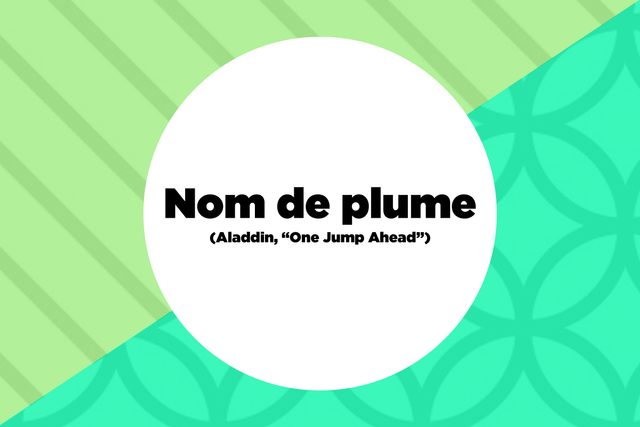
Nom de plume (Aladdin, “One Jump Ahead”)
Nom de plume is French for “pen name,” which Aladdin takes as a synonym for criminal alias when he sighs, “One jump ahead of the slowpokes/ One skip ahead of my doom/ Next time gonna use a nom de plume.“
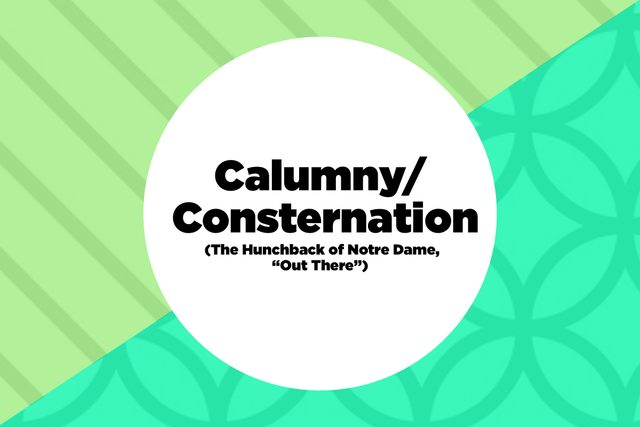
Calumny/Consternation (The Hunchback of Notre Dame, “Out There”)
A calumny is a false and slanderous statement, and consternation is a sudden, alarming dismay—two things the homebody hunchback Quasimodo is advised to fear of the outside world. Judge Claude Frollo warns poor Quasi: “Out there they will hate/ And scorn and jeer…Why invite their calumny/ And consternation? Stay in here.”

Wanderlust (The Aristocats, “Thomas O’Malley Cat”)
As you might guess from its two component words, wanderlust refers to the strong desire to travel—the lust to wander. Globe-trotting alley cat Thomas O’Malley has been all over Europe, and is quick to admit he’s always down for a trip: “I’ve got that wanderlust/ Gotta walk the scene/ Gotta kick up highway dust/ Feel the grass that’s green.”
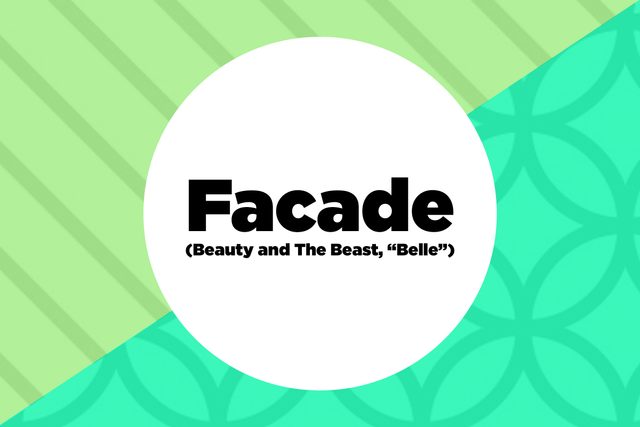
Facade (Beauty and The Beast, “Belle”)
A facade is an outward appearance used to conceal something. In the case of a tall building, the facade is the storefront facing the street; in the case of bookworm princess Belle, her beauty is the facade concealing a curious mind that her poor, provincial neighbors don’t quite understand. One local goes so far as to mention: “But behind that fair facade/ I’m afraid she’s rather odd”
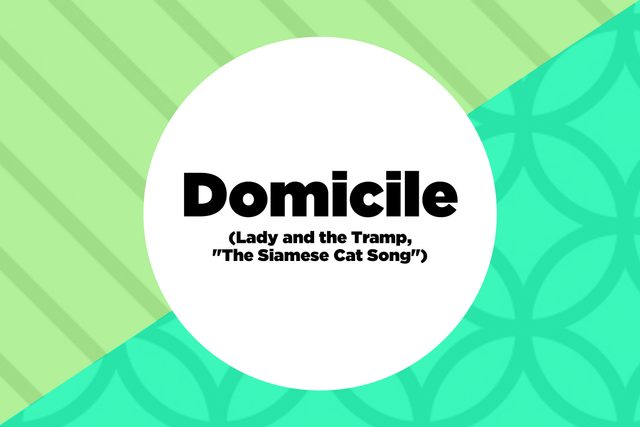
Domicile (Lady and the Tramp, “The Siamese Cat Song”)
A domicile is a place of residence or home. The creepy Siamese cats make Lady protective of hers when they threaten: “Now we’re looking over our new domicile/ If we like we stay for maybe quite a while.” Read up on these mindblowing facts about Disneyland.
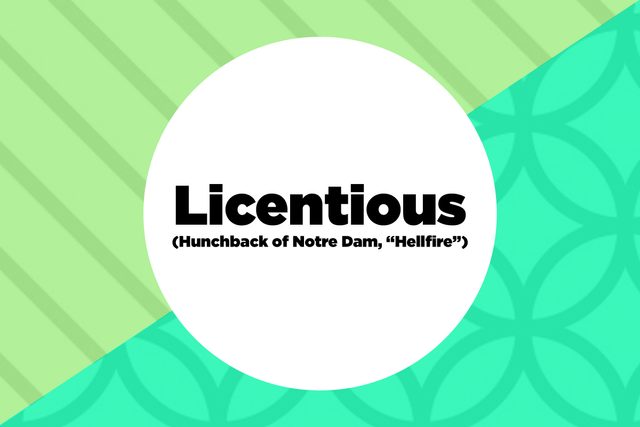
Licentious (Hunchback of Notre Dam, “Hellfire”)
Licentious means lewd or sexually promiscuous, but can also mean disregarding the rules. Both of those things bother the tyrannically pious Judge Claude Frollo in one of Disney’s darkest songs, when Frollo complains to the Virgin Mary of his fellow man: “You know I’m so much purer than/ The common, vulgar, weak, licentious crowd.”
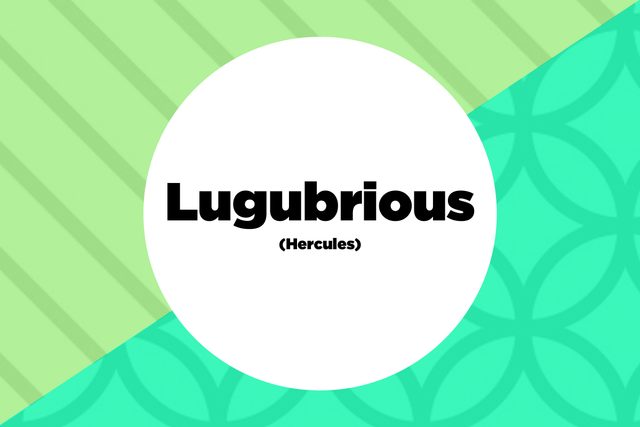
Bonus: Lugubrious (Hercules)
Lugubrious isn’t used in any Disney songs that we know of, but is too great a word to pass off. Meaning mournful, dismay, or gloomy, it’s the perfect word for one of Hades’ minions to bark when descending the stairs to serve his dark master: “Coming your most lugubrious-ness!” Next, read about the secrets Disney employees aren’t allowed to tell you.